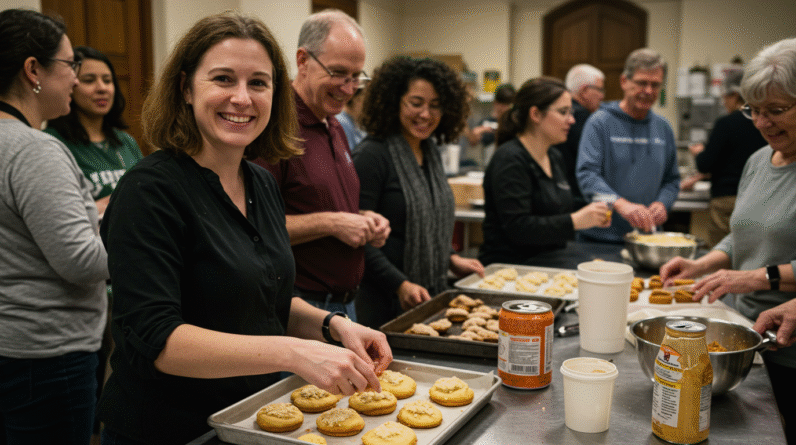5 Inspiring Bible Characters Who Served Others Faithfully
You’ve probably read stories in the Bible and felt both moved and challenged by them. The Bible isn’t just a collection of ancient tales — it’s a living guide that shows you how God uses ordinary people to serve others with faithfulness, courage, and humility. In this article, you’ll meet five Bible characters who served others in ways that still speak to your life today. As you read, look for the patterns of faith, obedience, and sacrificial love that defined them — and consider how those patterns can shape your own service.
Service isn’t always dramatic. Sometimes it’s gleaning in a field, sometimes it’s stepping forward to encourage a frightened church, sometimes it’s rebuilding a broken city. When you study Bible characters who served others, you’ll find that their actions were rooted in a relationship with God, not in a desire for recognition. Their stories point you back to the heart of the gospel: that Jesus came not to be served but to serve (see Mark 10:45). If you want to live a life of faithful service, these five examples will encourage you, stretch you, and give you practical steps to follow.
Ruth
Background
You meet Ruth in a time of loss. She’s a Moabite woman, married into an Israelite family, and finds herself widowed in a foreign land. But her story isn’t one of despair only; it’s a testimony to loyalty, faith, and the quiet power of serving others. At the heart of her story is a decision — a covenant of devotion to her mother-in-law Naomi — that changed the course of her life and, ultimately, the lineage of the Messiah. Ruth’s pledge, often quoted as a declaration of loyalty, shows how personal commitment to another person can be an act of faith: “Where you go I will go, and where you stay I will stay” (Ruth 1:16).
How she served others
Ruth’s service was practical and sacrificial. She went out to glean in the fields to provide food for Naomi and herself. When she arrived in Bethlehem, she sought to work quietly and faithfully, trusting God’s provision and the kindness of others. Her work ethic and humility opened doors: Boaz noticed her, praised her loyalty, and provided protection and provision for her and Naomi (Ruth 2:2; Ruth 2:11-12). Ruth served without fanfare, and God honored that service in ways that affected not just her immediate circumstances but the unfolding plan of redemption.
What you can learn
If you’re looking for models of faithfulness, Ruth teaches you that faithful service often looks ordinary. When you serve others — especially those close to you — you’re participating in God’s redemptive purpose. Your small acts of kindness and loyalty can have ripple effects you don’t see. Ruth’s example calls you to steady, humble service: to keep working, trust God when resources are scarce, and treat people with honor and faithfulness. As you live this out, you align yourself with the kind of sacrificial love Jesus models for you.
Barnabas
Background
In the early church, you need encouragers — people who uplift, advocate for, and invest in others. Barnabas is called “the son of encouragement” for a reason. He was a Levite from Cyprus who sold property to help the poor and who welcomed newcomers who were distrusted or misunderstood. The early book of Acts shows Barnabas acting as a bridge-builder, someone who believed in the potential of others and helped the church grow through patient encouragement (Acts 4:36-37).
How he served others
Barnabas served others by believing in them when others were skeptical. When Saul (Paul) first arrived in Jerusalem after his conversion, the disciples were afraid of him. Barnabas stepped in, introduced Saul to the apostles, and vouched for the genuineness of his conversion (Acts 9:26-27). Later, Barnabas was instrumental in encouraging the church in Antioch and in supporting missionary work; his generosity and reputation opened doors for the gospel (Acts 11:22-24). He partnered with Paul in mission work and exemplified sacrificial leadership, showing that service sometimes means investing time, reputation, and resources in people.
What you can learn
When you study Bible characters who served others, Barnabas reminds you that encouragement is a ministry. You may not always be called to perform the dramatic — sometimes you’re called simply to believe the best in someone, speak a word of support, or stand in the gap for a new believer. If you want to serve like Barnabas, look for people who are overlooked or under-resourced and offer your confidence and tangible help. Your encouragement could be the turning point in someone else’s life, and the church grows when people like you step up to cheer others on.
Joseph (son of Jacob)
Background
Joseph’s story is one of betrayal, suffering, patience, and eventual restoration. Sold into slavery by his brothers, falsely accused, and imprisoned, Joseph’s life could read like a tragedy — except that through his faithfulness and wise service, God used him to save many lives. You see God working through Joseph’s ability to serve faithfully in every setting, whether in Potiphar’s house, in prison, or at the palace of Pharaoh. Joseph’s trust in God and his refusal to succumb to bitterness are reasons his life is a powerful example of redemptive service.
How he served others
In every circumstance Joseph found himself, he served well. In Egypt, he interpreted dreams for others, served as an honest and efficient administrator, and used his position to store grain and prepare for famine, ultimately saving countless lives, including his own family’s (Genesis 41:39-41). When he finally revealed himself to his brothers, Joseph interpreted his suffering through the lens of God’s sovereignty: “You intended to harm me, but God intended it for good” (Genesis 50:20). His service was not self-seeking; it was aimed at preserving life and reconciling broken relationships.
What you can learn
Joseph shows you that service can be strategic and faithful even in unjust circumstances. When you serve others faithfully — whether in prison or in a position of influence — God can use your obedience for a greater good. You’re invited to trust God’s purposes even when life seems unfair. Like Joseph, serve with excellence, integrity, and a forgiving heart, because the Lord can redeem your suffering and use your faithful service to accomplish His purposes.
Dorcas (Tabitha)
Background
Dorcas, also called Tabitha, is a beautiful example of service expressed through acts of mercy. Living in Joppa, she was known for good works and for helping the poor — sewing garments and caring for those in need. Her life was so fruitful in service that when she died, the community felt the loss deeply and called for help, demonstrating how one person’s compassionate ministry can become woven into the fabric of a whole neighborhood (Acts 9:36-42).
How she served others
Dorcas’ ministry was hands-on and tangible. She used her skills to clothe widows and meet practical needs. When Peter was summoned, he prayed and raised her from the dead — a miraculous confirmation that God honors faithful, compassionate service (Acts 9:36-42). Her story challenges you to think about how your gifts and daily labor can be acts of ministry. The way she served was ordinary in method but extraordinary in its impact: people felt loved, supported, and seen.
What you can learn
If you’re wondering how to serve, Dorcas gives a clear model: use your gifts where people are hurting. Service doesn’t always need a pulpit or a promotion; it needs willing hands that will meet needs faithfully. When you make service a consistent part of your life, your community will notice, grieve when you’re absent, and remember how you reflected Christ’s compassion. Dorcas also reminds you that God often blesses small acts of kindness with big significance.
Nehemiah
Background
Nehemiah was cupbearer to the king, a position of trust, but his heart was in Jerusalem. When he heard the news that the walls of Jerusalem were broken and its people in great distress, he didn’t remain idle. He prayed, fasted, and then asked the king for permission to go rebuild the city walls. Nehemiah’s leadership blended prayerful dependence on God with practical planning and courageous action — a powerful combination when you think about service as public and communal engagement (Nehemiah 1:3-4).
How he served others
Nehemiah’s service was strategic and sacrificial. He surveyed the wreckage at night, called the people to work, and organized the rebuilding despite opposition and discouragement from enemies. His leadership also included protecting the poor from exploitation and addressing internal injustices, reminding you that service isn’t just about bricks and mortar but about justice and dignity for vulnerable people (Nehemiah 2:17-18; Nehemiah 5:14). He led by example, even accepting less for himself so others could have more. Nehemiah’s ministry was a powerful combination of prayer, planning, and perseverance in service.
What you can learn
When you study Bible characters who served others, Nehemiah teaches you how to translate compassion into concrete action. You’re called to notice the broken places in your community, to pray, to plan, and then to work — even if opponents stand in your way. Service sometimes looks like organizing, policy change, and confronting injustice, and it always begins with a heart of prayer. If you want to make a lasting difference, follow Nehemiah’s lead: prepare, partner with others, and persevere.

Common Threads in Their Service
Faithfulness over fame
When you look at these five Bible characters who served others, you notice a common thread: they weren’t serving for applause. They served because they loved God and loved people. Ruth gleaned quietly. Barnabas encouraged without seeking credit. Joseph administered Egypt with integrity. Dorcas served with needle and thread. Nehemiah organized with a heart for justice. Their service flowed from faithfulness, not a hunger for recognition. You’re invited to serve in that same spirit, trusting that God sees and rewards faithful hearts (Hebrews 6:10).
Service rooted in prayer and dependence on God
Another pattern is prayerfulness. Nehemiah prayed before he acted. Ruth trusted God’s provision. Joseph maintained faith in God’s sovereignty through hardship. Barnabas discerned and encouraged through the leading of the Spirit. If you want your service to be effective and Christ-centered, make prayer your first step, not your last resort. Jesus Himself modeled service out of intimate dependence on the Father, showing you that ministry without prayer loses its source and strength (John 15:5).
Practical compassion
Service in the Bible is often practical. Feeding the hungry, protecting the vulnerable, encouraging the discouraged — these are real, tangible acts. When you look for ways to serve, think practically: what needs are in front of you? What gifts has God given you to meet them? The characters you’ve just read about didn’t sit on theoretical compassion; they rolled up their sleeves and met needs.
How you can begin serving faithfully today
Start small and be consistent
You don’t have to move to the mission field to be a servant. Begin with the people closest to you. Like Ruth, serve loyally in your household and community. Like Dorcas, use practical skills to meet needs. Consistent, small acts of kindness build trust and open doors for the gospel.
Choose encouragement
Look for people who need someone to speak hope into their lives. Be a Barnabas: step forward when someone is doubted, and give them a chance. Your encouragement might be the first step in someone else’s journey into deeper faith.
Use your skills and position for others
Wherever God has placed you — in a workplace, school, or family — you can serve. Joseph used his administrative gifts for the common good. Nehemiah used his influence to rebuild walls and protect the poor. Ask God to show you how to leverage your position for others.
Pray and plan
Service without prayer can burn out. Follow Nehemiah’s model: pray, then plan, and then act. Let your plans be shaped by prayerful dependence on God’s wisdom and strength.
Persevere despite opposition
Not everyone will welcome your efforts. You may face resistance like Nehemiah did. Persevere in prayer and practical action; your persistence can break through barriers and bless many.
Final reflections
When you study Bible characters who served others, you’re reminded that God’s kingdom advances through people who are willing to give, encourage, lead, and love. These five — Ruth, Barnabas, Joseph, Dorcas, and Nehemiah — offer you models that are diverse yet united by faithfulness. They call you to trust God in suffering like Joseph, to serve humbly like Ruth, to encourage boldly like Barnabas, to give practically like Dorcas, and to lead courageously like Nehemiah.
If you’re feeling called to serve, remember that the ultimate model is Jesus Christ, who taught that greatness in the kingdom is measured by service (see Mark 10:45; John 13:14-15). Your service, no matter how small, matters to God and to the people you touch. Let these Bible characters who served others be your companions on the road of discipleship.
Explore More
For further reading and encouragement, check out these posts:
👉 7 Bible Verses About Faith in Hard Times
👉 Job’s Faith: What We Can Learn From His Trials
👉 How To Trust God When Everything Falls Apart
👉 Why God Allows Suffering – A Biblical Perspective
👉 Faith Over Fear: How To Stand Strong In Uncertain Seasons
👉 How To Encourage Someone Struggling With Their Faith
👉 5 Prayers for Strength When You’re Feeling Weak

📘 Jesus and the Woman Caught in Adultery – Grace and Mercy Over Judgement
A powerful retelling of John 8:1-11. This book brings to life the depth of forgiveness, mercy, and God’s unwavering love.
👉 Check it now on Amazon
As a ClickBank & Amazon Affiliate, I earn from qualifying purchases.
Acknowledgment: All Bible verses referenced in this article were accessed via Bible Gateway (or Bible Hub).
“Want to explore more? Check out our latest post on Why Jesus? and discover the life-changing truth of the Gospel!”








